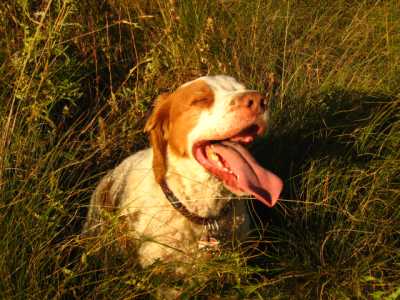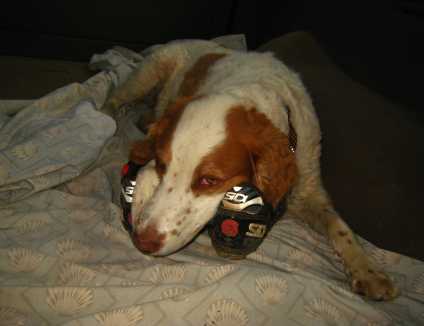 As with most things Duke-related, it began with food and ended with food. Recently our buddy Duke was diagnosed with Addison's Disease, a partial or complete shutdown of adrenal gland function in the body. Here's the story...
As with most things Duke-related, it began with food and ended with food. Recently our buddy Duke was diagnosed with Addison's Disease, a partial or complete shutdown of adrenal gland function in the body. Here's the story...
Five weeks ago today I picked up Duke from the kennel. He boarded at Critter Sitters with his buddy Everest while I rode mountain bikes in Moab with Steve, Jim, Mike and Mat. Our dogs have stayed at Critter Sitters numerous times in the past so they're used to the mayhem. Upon their return home Monday evening both dogs slept a lot, no doubt catching up on their Zs after all that kennel excitement. Tuesday was much the same, lots of snoozing. However Tuesday night I noticed Duke had not eaten much dinner. Often after he cleans out a neighbor's trash can or eviscerates a ground squirrel or plunders our last loaf of bread he'll skip a meal. This was different.
Wednesday morning I realized Duke's gait was a bit "funny". His hindquarters seemed weak and floppy. He hardly wanted to run around the neighborhood with me on the townie. Usually Duke is out in front pulling me (and the bike!) along to find all the fantastic new scents in C.B. South, so this behavior was alarming. During our Wednesday jaunt he held back, walking and trotting slowly, obviously not feeling good. That night he vomited several times in the house, a yellow-green liquid bile with no real solid content.
Mrs. Flyingcracker returned from visiting her parents on Thursday and checked out Duke's spine. After a few adjustments Duke seemed a bit better but he still wouldn't eat more than a few spoonfuls of delicious PetGuard Lamb & Brown Rice canned food. Duke's condition deteriorated over the weekend, including more vomiting, tremors, hardly any pooping and some unusual behavior like hiding in the far corner of a storage closet. Fearing another situation like what happened to Toby, we made an appointment for Duke with Dr. Steffanie Jacobson at Tomichi Pet Care Center.
 Duke got a thorough exam from Dr. Jacobson. Nothing particular caught her attention except for a low body temperature and some stronger than normal reflex response. (Reflex testing on dogs is similar to when a doctor taps your knee with a rubber hammer and your leg jerks up involuntarily.) Given the lack of obvious indicators Dr. Jacobson recommended a comprehensive blood test. Duke gamely offered his leg and the technician drew a sample.
Duke got a thorough exam from Dr. Jacobson. Nothing particular caught her attention except for a low body temperature and some stronger than normal reflex response. (Reflex testing on dogs is similar to when a doctor taps your knee with a rubber hammer and your leg jerks up involuntarily.) Given the lack of obvious indicators Dr. Jacobson recommended a comprehensive blood test. Duke gamely offered his leg and the technician drew a sample.
Two days later a call from the vet told us the blood test results had arrived, showing a strong possibility of Addison's Disease. Among other readings, Duke's potassium (K) was 8 (high) and his sodium (NA) was 125 (low). A normal ratio for NA/K is in the range 27 - 40. Duke's ratio was 15.4, way too low. Even more disturbing was his elevated potassium level. The adrenal gland has two main functions: 1) providing adrenalin for handling stress, and 2) regulating the electrolyte balance in the body. If the adrenal gland is not functioning correctly and the potassium level gets too high (~12) a dog (or human for that matter) can die within days. We hurriedly got Duke admitted to the Pet Care Center ICU where he received a definitive test for Addisons Disease. Friday morning we learned that the test results were positive, that Duke has Addisonian Hypoadrenocorticism commonly known as Addison's Disease.
From our perspective a positive Addisons diagnosis was a good result because most animals respond well to treatment and can live a normal life.
(Coming soon: "Treatment for Addisons and Duke's Response")